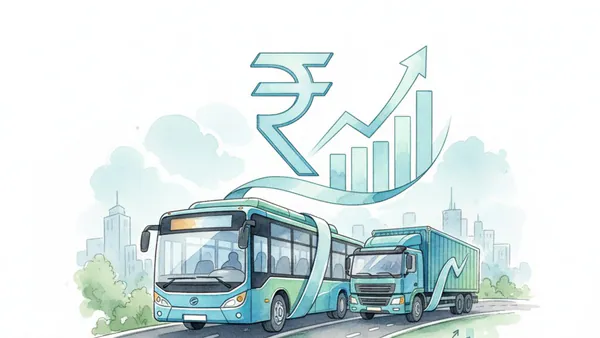
India's Next EV Push: Easier Loans For Electric Trucks And Buses In The Works
NEW DELHI: The Centre is preparing a new financing scheme aimed at accelerating the adoption of electric trucks and buses, targeting one of the biggest bottlenecks in India's transition to green mobility-the lack of affordable credit for fleet owners.
The ministry of heavy industries (MHI) and the department of financial services (DFS) under the finance ministry have begun discussions on a new framework to support commercial electric vehicle (EV) financing, according to two people aware of the development. The plan follows recommendations made by NITI Aayog earlier this year and could involve incentives for lenders and structured guidelines for extending credit to buyers of electric commercial vehicles.
Also Read | Solar-powered cars and trucks are almost h“Talks have started between MHI and DFS for going ahead with the NITI Aayog recommendation," said one of the two people cited above, requesting anonymity. No funding corpus has yet been finalized, the person added.
The proposed scheme seeks to make borrowing cheaper for electric truck and bus buyers by encouraging banks and non-banking financial companies (NBFCs) to lend at lower rates and design products that shift costs from upfront capital expenses to operational expenses, the second person said, requesting anonymity.
In an August report titled Unlocking a $200 Billion Opportunity: Electric Vehicles in India, the government think tank had recommended creating a pooled fund from public and multilateral sources to provide low-interest loans, especially to small transport operators. NITI Aayog suggested the scheme be implemented within a year of its recommendation.
Also Read | Data dilemma: Should India's inflation gauge take free foodgrain into accouEmail queries sent to MHI, DFS, and NITI Aayog on 3 November remained unanswered.
Financing the shiftThe push for a financing mechanism comes as India seeks to cut its dependence on fuel imports and move toward net zero emissions by 2070. While policy incentives such as FAME and PM E-Drive have boosted electric two- and three-wheeler sales, large commercial vehicles remain a laggard.
Electric trucks and buses cost two to three times as much as their internal combustion engine (ICE) equivalents, a major deterrent for small fleet operators. An electric bus costs approximately ₹1-1.25 crore or more, while a diesel bus may cost ₹25-50 lakh, depending on size. Heavy electric trucks, upwards of 12 tonnes in gross vehicle weight, are similarly priced at ₹1-1.5 crore compared to ₹25-50 lakh for their diesel counterparts.
“Lenders encounter higher risks when financing e-trucks and e-buses, as their upfront costs are roughly 2.5 times those of comparable diesel vehicles. The absence of a mature resale market and uncertainty around residual values further elevate the perceived risk," said Dhiraj Agrawal, chief business officer at Mufin Green Finance, an EV financier.
Residual value, the estimated worth of a vehicle at the end of its loan term, tends to be lower and more uncertain for EVs because their batteries depreciate faster than ICE engines. That makes battery health tracking crucial for lenders evaluating asset quality and resale potential.
The NITI Aayog report also noted that truck and bus ownership in India is highly fragmented, with small players struggling to secure financing for high-value EVs.
“Lenders use vehicle telematics, battery health monitoring, and maintenance records to track asset performance and usage. However, the lack of standardised frameworks for reporting battery degradation and forecasting residual values in India complicates asset monitoring," said Agrawal.
Also Read | Legacy two-wheeler leaders Hero, TVS crack open e-motorcycle tExperts said the absence of reliable performance data on e-trucks and e-buses makes it harder for financiers to assess risk, further constraining credit flow to the segment.
Despite policy support, adoption remains slow. As of 2024, electric buses accounted for just 7% of total bus sales in India, compared to 50% in China and 14% in Europe. Heavy-duty electric truck adoption stood at just 0.07%, versus 3% in China and 2% in Europe, according to NITI Aayog.
The new financing plan, if executed, could mark a shift from subsidy-led support to credit facilitation, aligning India's EV policy with global best practices that emphasize risk-sharing and financial de-risking.
Legal Disclaimer:
MENAFN provides the
information “as is” without warranty of any kind. We do not accept
any responsibility or liability for the accuracy, content, images,
videos, licenses, completeness, legality, or reliability of the information
contained in this article. If you have any complaints or copyright
issues related to this article, kindly contact the provider above.


















Comments
No comment